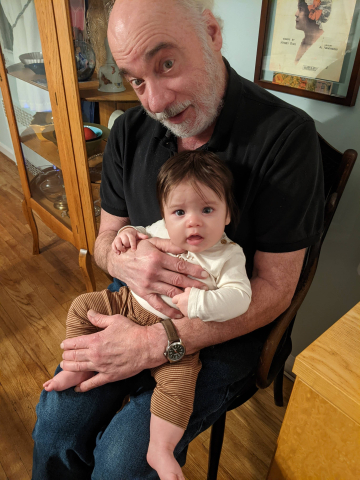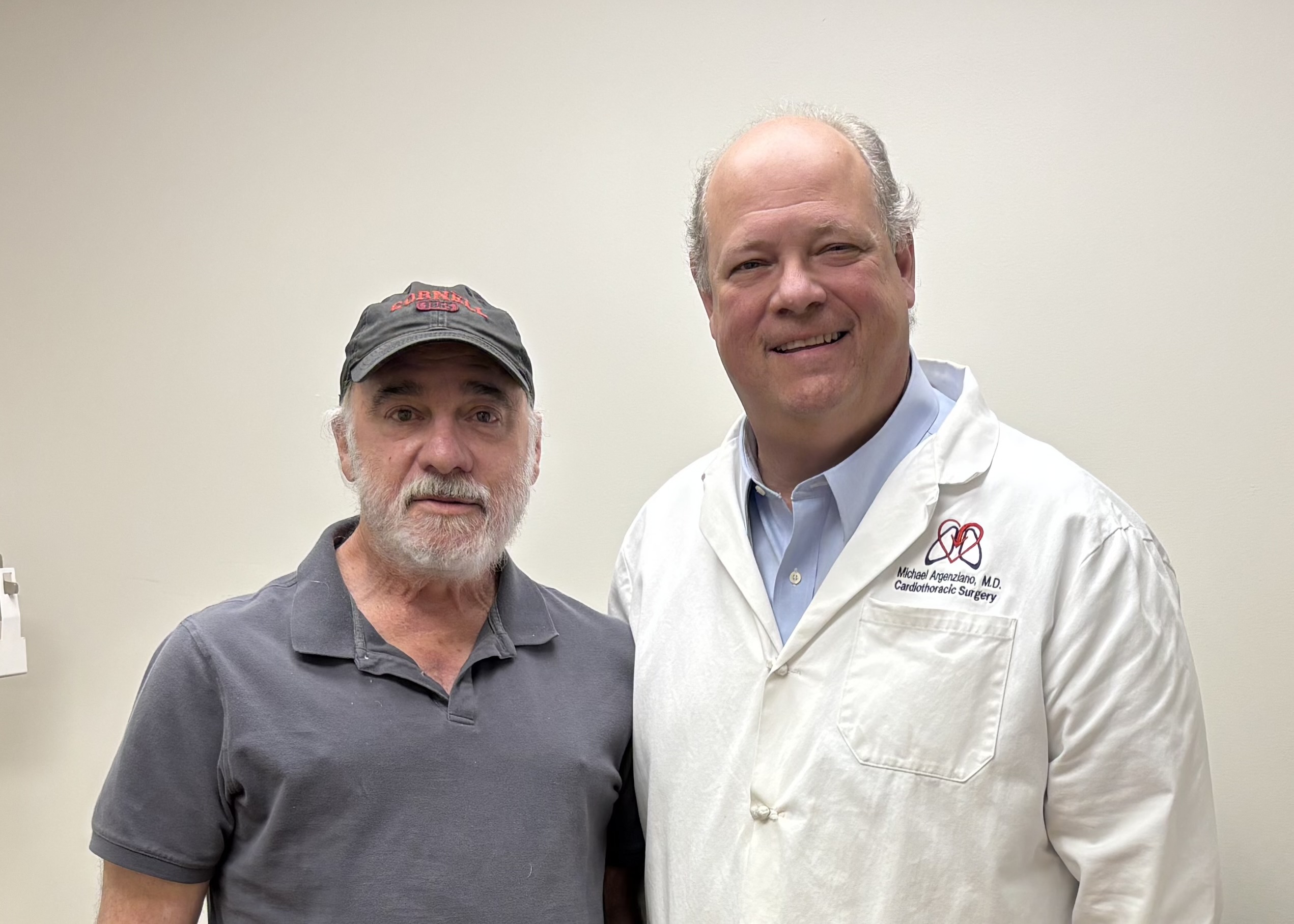David Higgins spends his mornings the way he sometimes imagined retirement might look: slowly, with intention. A walk if the weather holds, a few small repairs around the house, coffee at the kitchen table. Most days, he goes down the road to check in on his mother Ann, who, at 97, is still fiercely independent, though she sometimes needs a hand with the small things.
He retired after 40 years working as a stationary engineer for the state, maintaining the heating and ventilation systems that keep institutional facilities running. “It was work that lets you live where you want to live up here,” he says simply.
For David, where he has always wanted to live is right where he grew up, the foothills of the Catskill Mountains in Sullivan County. Where he spent his youth wandering outdoors, where community has never been far, and where his mom still occupies the house he grew up in.
“I just started the retired life,” he says. “But fate intervened.”
Caring Across Generations
Retirement had not been idle. Earlier in the year, David’s mother underwent surgery and treatment for bladder cancer. He moved in with her during her recovery, helping however he could. She recovered well, and only a couple of days after she finished treatment, their family gathered to celebrate his daughter Emily’s baby shower. “Emily was having her first child,” he says. “That was coming very soon, and we were all excited.” Still a doting son and father, David was now preparing to be a grandfather.
But caring for family also required caring for himself. The following Tuesday, he had a full knee replacement, a long-delayed procedure after years of wear and a fall from a ladder at work had made the pain impossible to ignore. He recovered steadily, did his rehab, and regained full range of motion.
“Everything was going swimmingly,” he says. “And a week later, boom, the heart attack hit.”
That Voice on the Radio
A few days before he got sick, while listening to the radio, something small caught his attention during a commercial break—one of those state-sponsored public service announcements. “It said if you think you’ve got a little summer cold, it might be something more than that,” he recalls. “And it stuck in my mind for some reason.”
So when he developed congestion and a stubborn cough, and no over-the-counter remedy seemed to help, that PSA returned front of mind.
David was staying with his mother then, still helping her get back into routine. But by that afternoon, he realized he couldn’t ignore his symptoms anymore. “I said, ‘Ma, you got to take me to the emergency room.’” And at 97 years old, she drove her son straight there.
Things moved rapidly at the local hospital. A sequence that zipped from his mother’s car to an ER bed, into an ambulance that transferred him to another facility, which then called for medical evacuation straight to New York City for more advanced care.
David remembers almost none of it.
Dreamworld
When he finally woke up, he was in Manhattan, in the ICU of NewYork-Presbyterian/Columbia University Irving Medical Center and nothing made sense. “I didn’t know where I was or why I was there or which way was up,” he says.
David was disoriented, convinced he was being kept there against his will. At one point, he explained to the night nurse, Mike, that there was nothing wrong with him and he needed to go home to take care of things. Mike gently told him, “Mr. Higgins, you’re a very sick man. You’ve had open heart surgery.”
“I had no idea, none,” David says. “I didn't believe Mike when he told me.”
Even with tubes still in place, surrounded by monitors, nothing felt real. How could this be his life? He thought for days that he had been in a car accident; in all the confusion, his mind offered a story to fill the blank space. He describes, with startling clarity, the image of his car upside down in the water. “If you’re the person who’s going through that, you actually believe these things,” he says. “I have a whole lot more sympathy for people who are classified as delusional.”
It wasn’t until his daughter's in-laws visited and he saw those familiar faces in that foreign room that the pieces began to align. “Maybe it was due to a fading of the effects of shock and sedatives, combined with their familiar presence, but they were like these two points of reality,” he says, “and it was like, oh, okay. Something really radical has happened.”
What Happened Medically
David experienced a heart attack that led to a rare complication called papillary muscle rupture, which can cause the heart’s mitral valve to fail suddenly. His heart was unable to pump enough blood to the rest of his body, a condition known as cardiogenic shock.
He was airlifted to Columbia in the middle of the night, where cardiac surgeon Michael Argenziano, MD, conducted an emergency operation. He performed a procedure known as mitral valve replacement and CABG (Coronary Artery Bypass Grafting), where an artery or vein from another part of the body is used to reroute blood flow around the blockage. David’s heart was so sick that he was also placed on ECMO, a machine that operates as the heart-lungs when your own cannot, to stabilize his heart and allow it to recover.
Community Forms a Chain of Care
Only afterward did he learn the scale and urgency of what happened, including being airlifted in the night. “I exercised no agency on anything,” he says. “It was just a series of professionals who just sort of formed a chain, and each one did what they were supposed to do.”
His family stepped in, too. David’s mother was cared for by their relatives; his home tended to, plants watered. Someone fed Fiona, his prickly and beloved cat. “They were quite willing to put up with the peril,” he says, laughing.
Emily, meanwhile, was nearing the end of her pregnancy. “People close to me didn’t know what was going to happen. I know they were scared and stressed,” he says. “If I had dealt with this earlier, it probably wouldn’t have been as difficult for them.”
His one piece of advice is offered without preaching: “Take it seriously. If you have the resources available, use them. It saves you a lot of pain and a lot of damage. And for the people close to you, too.”

Now, A Grandfather
His grandson, Alan, was born on August 3rd. David met him two weeks later, outside the lobby of the hospital. Given his emergency arrival and the lack of clothes on hand, one of the nurses loaned him a pair of surgical scrubs for the occasion. “It was a little different from how I expected our first meeting to play out,” he says. “But it was so good to see him. Totally, completely surreal, really.”
Only weeks after waking in a hospital room, unsure of where he was or what had happened, there David stood, on pavement, in the hot summer sun, wearing borrowed scrubs to hold his first grandchild for the very first time. Fully present in a world brand new.
Today, healing is ongoing. David goes on walks. He’s still breathing carefully. He sees Dr. Argenziano for post-op appointments close to home, in Goshen. “I was hoping there would be [a Columbia] office up here, which was great,” David says. “And as it turns out, one of my uncles had a heart surgery by my surgeon, and his cardiologist, Dr. Singh, is in the same office in Goshen. I didn't realize that until after I actually had my follow-up.”
Little by little, David returns to himself, waiting for the day he can lift more than 20 pounds again. “I look forward to getting back to the strength I had,” he says. “To taking care of other people rather than being kind of dependent.”
The most vivid impression that lingers for David is one of gratitude (and not a little amazement) for the many people who helped along the way. "Be they relatives, neighbors, or friends, who were willing to help us without being asked—they did everything: cleaning, cooking, fixing machinery, praying, you name it," he explains. "I cannot adequately express how much difficulty and stress their efforts alleviated for us. But I'll certainly not forget."
Retirement, in its quiet way, still holds so much ahead: the return to a long potter through the trees; the joy of coming holidays with extended family all around; those quiet mornings of sipping coffee with the mountains he’s known since birth. And, perhaps most importantly, unlimited time with Alan, getting in the dirt, fostering imagination, sharing that unbridled love for his family and the natural world.
Related
- 10 Facts You May Not Have Known About Heart Attacks
- In Every Movement: A Musician’s Path Through Surgery and Survival
- Overcoming Fear Before Open Heart Surgery
- Orange County Cardiology & Cardiac Surgery Services

